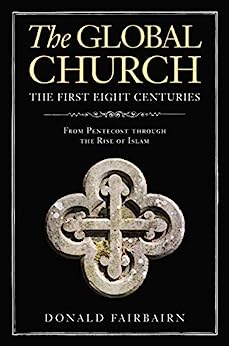
Donald Fairbairn
Reviewed by: Calvin R. Goligher
The Global Church—The First Eight Centuries: From Pentecost Through the Rise of Islam, by Donald Fairbairn. Zondervan, 2021. Hardcover, 416 pages, $9.79 (Amazon). Reviewed by OP pastor Calvin R. Goligher.
Donald Fairbairn’s new history of the early church stands out because it tells the story as if the Church’s most important beliefs were actually true. Fairbairn straightforwardly tells how Jesus commissioned the apostles, who took a single gospel throughout the known world. From there, he tells how this gospel was received and preserved in a wonderful unity across an enormous variety of cultures, languages, and geographies.
Fairbairn is a clear writer with a gift for narrating complicated events and ideas in a simple and memorable way. This clarity is not just a matter of writing style, though. Where Fairbairn truly stands out as a teacher is in his theological and historical accuracy and reliability. The study of the early church has been plagued for more than a century with various kinds of spin—for instance, that there were a variety of other gospels, or that “orthodoxy” was just the product of the bishops’ political victory. Fairbairn reliably guides readers through a tangle of these misleading historical interpretations, thus managing to tell the church’s history from the church’s own perspective.
Fairbairn offers brief reflections at the close of each chapter, giving a balanced evaluation of an aspect of early Christianity. For example, he reflects on monasticism’s crucial contributions to world mission, doctrine, piety, and social action, while also noting its limitations and failures.
This “global history” addresses not only the parts of early Christianity most familiar to us (the city of Rome, for instance) but also the parts most of us have never heard about: Persia, Ethiopia, Georgia (the country, not the state!). Readers may spot their homes in the story: I was thrilled to notice Northern Ireland (where my parents were born), and various members of the church that I pastor will spot their ancestral homes in Iran, Kerala, and Armenia. This global narrative is an excellent reply to the idea that Christianity is “western,” “colonialist,” or even “white supremacist.” For eight centuries, Christian beliefs and practices were formed mostly in Africa and Asia and shared across the known world. This profound commonality was finally interrupted by the sudden arrival of Islam, which Fairbairn narrates very thoughtfully—another rare feature of a textbook on Christian history.
Beginners (the primary audience of this text) should know that some of Fairbairn’s interpretations are controversial. He lays the major share of the blame for the Arian controversy at the feet of Origen. He dramatically emphasizes the consensus and unity of the church’s doctrine, even in those episodes where its tendency to fragmentation was most clearly on display. Most notably, he maintains that underneath the church’s sharp divisions over the Chalcedonian Definition lay a true consensus on the doctrine of the person of Christ. On many of these points, Fairbairn takes a minority position, but his arguments are clear and well grounded in the historical evidence.
Modern Christians who are looking for roots will be glad to learn that the early church enjoyed a long, broad, stable, Christian faith. This history shows us a faith in which we can happily abide, despite our precarious position in modern society. It shows us a faith that can draw us together, despite differences of language, culture, geography, and denomination. Mostly, it shows a Savior who really is “the desire of the nations,” in whom we can confidently trust.
March 30, 2025
On the Trail with a Missionary
March 23, 2025
Midnight Mercies: Walking with God Through Depression in Motherhood
March 16, 2025
March 09, 2025
Zwingli the Pastor: A Life in Conflict
March 02, 2025
February 23, 2025
African Heroes: Discovering Our Christian Heritage
February 16, 2025
© 2025 The Orthodox Presbyterian Church